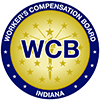INDIANA WORKER’S COMPENSATION FORMULARY
GUIDANCE FOR IMPLEMENTATION OF
PL 206; IC 22-3-3-4.7 /22-3-7-17.6
The law may be viewed HERE.
The Official Disability Guidelines (ODG), Appendix A may be viewed HERE.
The ODG Drug Formulary training webinar may be downloaded HERE.
This is a fluid document that will change from time to time. Please check the WCB website periodically for updates. Additions will be put at the beginning and will be dated. This document is neither law nor formal regulation. Rather, it is the agency’s informal guide to meeting the requirements of the law.
What does the new law mean?
If a medical provider in a worker’s compensation case prescribes a medication that is a non-preferred drug, if the injured worker wants the employer/insurance carrier; “payer” to pay for that drug, the payer must approve the prescription. Otherwise, the injured worker may still fill the prescription but will have to pay for it out of pocket.
Indiana only adopted the Formulary found at Appendix A. It did not adopt the treatment guidelines.
Prescribing an N Drug
Beginning on January 1, 2019, should a medical provider wish to prescribe a medication listed as an N Drug in the ODG Appendix A, to a worker’s compensation patient, the provider must first contact the payer to ascertain whether the drug will be covered. If the N Drug is being prescribed due to/ in a “medical emergency” situation, the prescriber should state this in the request because the N Drug will be permitted during the emergency.
A payer is the case manager, insurance adjuster or third party administrator monitoring the injured worker’s case on behalf of the employer, or the employer itself. This contact may be as casual as a phone call or e-mail or as formal as a written request, as determined by the provider and the payer. The method used in a group health setting is also acceptable in the worker’s compensation setting; however, notice of the request should also be given to the injured worker, either directly or through their attorney. This may be satisfied during a medical appointment by telling the worker that permission to fill an N drug prescription is being sought.
Payer or Reviewer Approval
Approval of a prescription for an N drug is only effective for that single prescription order unless otherwise indicated. If the medical provider wishes to prescribe the same N drug again after one round was approved for an injured worker, the same request and review process will be necessary with additional support.
Payer Denial of N Drug Prescription and Review
If the payer does not approve the request, payer must send the request to an organization possessing a current URAC Workers’ Compensation Utilization Management Certification or a Workers’ Compensation Pharmacy Benefit Management Certification for review and should notify the prescriber and worker of the initial denial and review.
The payer must convey the decision of the reviewer to the prescriber and injured worker. This notice should preferably be in writing but may be by e-mail.
Reviewer requirements
Payer and the review organization selected must have a process in place to avoid conflicts of interest in evaluating N Drug prescription requests. URAC’s Independent Review Organization Accreditation Standards, Version 5.0 should be followed; specifically IR 11-14 regarding conflicts of interest. Review of Indiana’s laws on accreditation of utilization review agents is also suggested. While a Certificate of Registration is not currently required in Indiana if the reviewer will only work in the worker’s compensation arena, it is encouraged. See IC 27-8-17-9 et seq.
A list of URAC qualified organizations may be found HERE. Please use the drop down menu under the "Program" section and select the option "Workers' Compensation Utilization Management" and click submit. This will bring up the latest list of URAC qualified organizations.
Insufficient Information from Prescriber
A denial should not be issued based on a lack of information from the prescribing physician. Rather, questions should be directed to the physician and the time frame set out at IC 22-3-3-4.7(e)(2)/ 22-3-7-17.6(e)(2) shall not begin to run until sufficient answers are received.
Challenging a Denial
Appeals of denials under IC 22-3-3-4.7(g)(2)/22-3-7-17.6(g)(2) may be made by petition to the appropriate Single Hearing Member in a disputed case and to the Chairman in non-litigated claims. Such appeals will be treated as emergency requests and addressed accordingly.
Grandfathering
Please note the grandfathering provision found at IC 22-3-3-4.7(c)/22-3-7-17.6(c) does not apply to prescriptions of N drugs begun after July 1, 2018. An appeal will be necessary for such prescriptions after January 1, 2019.
Compounding Drug Prescriptions
All compounding drugs will be N drugs as of January 1, 2019.
